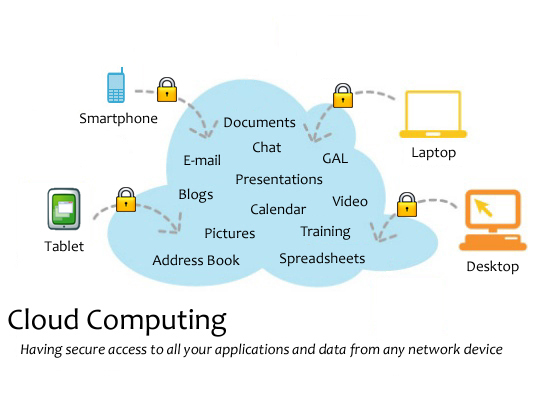May 23rd, 2011 by DavedeBronkart in Health Policy, Opinion
4 Comments »

*Editor’s note: Dave would like readers to check out the comments section in the original post for his full views.*
A lot of people are intrigued with using “cloud” applications and storage for personal health data. This week we’re seeing what I think is the final nail in the coffin of “cloud only” for anything important. You gotta have offline backups: two huge cloud vendors – Amazon and now Google – have demonstrated that even they can go down, leaving their users absolutely powerless.

Cloud computing (Wikipedia) is hugely attractive to software developers and businesses. As shown in this diagram from Wikipedia, the idea is that you do your computing using storage or tools that are on some computer somewhere out there “in the cloud.” You don’t know or care where, because somebody out there takes care of things. As your business or database grows, “they” take care of it.
And it’s real – it works.
But when “they” screw up, you could be screwed.
Last month Amazon Web Services went down for a couple of days. PC Magazine posted a good summary, and many of us learned that well known companies like Hootsuite and Foursquare don’t actually own the computers that deliver their product: they rent services from Amazon Web Services (AWS). So when AWS went down, there was nothing they could do to help their customers. Read more »
*This blog post was originally published at e-Patients.net*
April 7th, 2011 by Davis Liu, M.D. in Health Policy, Opinion
No Comments »

There are many tips to saving money on medical costs like asking your doctor only for generic medications, choosing an insurance plan with a high deductible and lower monthly premiums, going to an urgent care or retail clinic rather than the emergency room, and getting prescriptions mailed rather than go to a pharmacy.
 How about getting your old medical records and having them reviewed by a primary care doctor? It might save you from having an unnecessary test or procedure performed.
How about getting your old medical records and having them reviewed by a primary care doctor? It might save you from having an unnecessary test or procedure performed.
Research shows that there is tremendous variability in what doctors do. Shannon Brownlee’s excellent book, Overtreated – Why Too Much Medicine Is Making Us Sicker and Poorer, provides great background on this as well as work done by the Dr. Jack Wennberg and colleagues on the Dartmouth Atlas. Some have argued that because of the fee for service structure, the more doctors do the more they get paid. This drives health care costs upwards significantly. Dr. Atul Gawande noted this phenomenon when comparing two cities in Texas, El Paso and McAllen in the June 2009 New Yorker piece. Read more »
*This blog post was originally published at Saving Money and Surviving the Healthcare Crisis*
March 17th, 2011 by DavidHarlow in Health Policy, Opinion
No Comments »

HealthNet either lost, or had stolen from it, computer hard drives with PHI of 1.9 million subscribers that had been in a California facility. This latest HealthNet data security breach, which may have included names, Social Security numbers, addresses, health information and financial information comes a little over a year after a widely-reported data security breach by HealthNet in Connecticut which resulted in the first state Attorney General action under the HIPAA amendments contained in the HITECH Act. HealthNet is notifying affected individuals and is offering two years of no-cost credit monitoring and fraud resolution services, and credit restoration and identify theft insurance as needed.
It’s both surprising and unsurprising that this has happened again to HealthNet. In these cases, and in recent cases in Massachusetts (Mass General Hospital HIPAA settlement) and Maryland (Cignet HIPAA violations and CMPs), we have seen examples, collectively, of individual sloppiness, of ineffective corporate policies and procedures, and possibly of gross neglect/fraud/incompetence. The question arises: Is HIPAA the right instrument to address all three sorts of problems? Since it seems that it is not having an effect on any of them, I would suggest that the answer is no. Read more »
*This blog post was originally published at HealthBlawg :: David Harlow's Health Care Law Blog*
August 17th, 2010 by DrWes in Better Health Network, Health Tips, News
No Comments »

Sending a child off to college? Call your lawyer first. From the Weekend Wall Street Journal:
After a few clients ran into difficulty getting information about adult children who were ill, Sheila Benninger, an attorney in Chapel Hill, N.C., began recommending that clients’ children designate a health-care power of attorney after they turn 18 to identify who can speak for them if they can’t.
She also includes a Health Insurance Portability and Accountability Act, or HIPAA, release form that allows patients to determine who can receive information about their medical care and whether information about treatment for substance abuse, mental health or sexually transmitted diseases can be disclosed.
You don’t have to use a lawyer. Generic health-care power-of-attorney forms can be found online. If the school has a HIPAA release online, it’s best to use that more-tailored document.
Parents should keep a copy in an email folder, where it can be easily accessed in an emergency. And students should designate a general power of attorney so someone can pay bills or handle other issues if they go abroad.
It’s good advice for those of us shipping one more child back to college this week.
-WesMusings of a cardiologist and cardiac electrophysiologist.
Hat tip: Instapundit
*This blog post was originally published at Dr. Wes*
August 13th, 2010 by DavedeBronkart in Better Health Network, Health Policy, Opinion, True Stories
No Comments »

 Next in our series on my experience with OpenNotes, a project sponsored by the Robert Wood Johnson Foundation’s Pioneer Portfolio.
Next in our series on my experience with OpenNotes, a project sponsored by the Robert Wood Johnson Foundation’s Pioneer Portfolio.
This item has nothing to do with OpenNotes itself –- it’s what I’m seeing now that I’ve started accessing my doctor’s notes. In short, I see the clinical impact of not viewing my record as a shared working document.
Here’s the story.
______
In OpenNotes, patient participants can see the visit notes their primary physicians entered. Note “primary,” not specialists. I imagine they needed to keep the study design simple.
So here I am in the study, going through life. Five weeks ago I wrote my first realization: After the visit I’d forgotten something, so I logged in. Read more »
*This blog post was originally published at e-Patients.net*



















